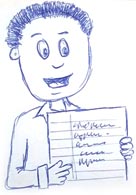Reproduction
Key Words
DNA - contains deoxyribonucleic acid a chemical that all of the genetic material in a cell is made up from. It is also a polymer.
Chromosomes - really long molecules of DNA. Chromosomes come in pairs.
Gene - a small section of DNA found on a chromosome.
Genome - the entire set of genetic material in an organism.
Nucleotides - repeating units that make up the DNA strands.
mRNA - a molecule which acts as a messenger between the DNA and the ribosome.
Enzymes - biological catalysts that speed up chemical reactions in the body.
Hormones - carry messages around the body.
Mutations - random changes in an organism's DNA. These can sometimes be inherited. Three types of mutation are:
- Insertions - a new base is inserted into the DNA base sequence.
- Deletions - a random base is deleted from the DNA base sequence.
- Substitutions - a random base is changed in the DNA base sequence.
Sexual reproduction - genetic information from two organisms (a father and a mother) is combined to produce offspring which are genetically different to the parent.
Asexual reproduction - carried out by mitosis. There is only one parent so the offspring are genetically identical to that parent.
Gametes - contain 23 chromosomes. Instead of having two of each chromosome, a gamete has just one.
Meiosis - produces cells which have half the normal number of chromosomes.
X and Y chromosomes - males have an X and a Y choromosome (XY), females have two X chromosomes (XX).
Alleles - different versions of genes.
Homozygous - when an organism has two alleles for a particular gene that are the same.
Heterozygous - when an organism has two alleles for a particular gene that are different.
Dominant allele - the allele for the characteristic that's shown when two alleles are different.
Recessive - the allele for the characteristic that is not shown when two alleles are differnet.
Genotype - combinations of alleles you have.
Phenotype - the characteristics you have.
Recessive allele - people with one copy of the allele (a carrier) won't have the disorder. However for a child to have the disorder both parents will have to be carriers.
Cystic Fibrosis - genetic disorder caused by a recessive allele. The body produces a lot of thick sticky mucus in the air passages and int the pancreas.
Dominant allele - only one parent needs to be a carrier in order for the child to be able to inherit the condition.
Polydactyly - genetic disorder caused by a dominant allele. A baby is born with extra fingers or toes.
IVF - fertilising and egg with sperm in a lab.
Embryonic screening - a embryo cell is analysed for it's genes before the embryo is implanted after IVF.
Gregor Mendel - an Austrain monk who noted how characteristics in plants where passed on from one generation to the next.
Also see Hormonal coordination, Genetics & Evolution,
Links for Learning
Websites  Videos  Games  Quizzes
Your Genome: What is DNA?
Your Genome: What is a chromosome?
Your Genome: What is a gene?
Your Genome: What is a genome?
Bitesize: Reproduction, the genome and gene expression
Pass my exams: Alleles
Revision World: Alleles and Inheritance
Bitesize: Genetic Inheritance
Your Genome: What is inheritance?
Bitesize: Inherited disorders
Your Genome: What is a mutation?
Your Genome: What types of mutation are there?
Bitesize: Genetic diagrams
Bitesize: Reproduction, the genome and gene expression test
Bitesize: Genetic Inheritance test
Find out what kind of learner you are and the best revision techniques for you.
Visit our Revision Tips page for more.



